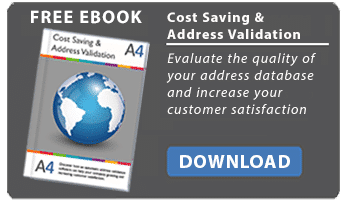
An international mailing address often represents a nucleus of little known information and therefore difficult to decipher, especially for those who are not familiar with the language of the target country of the shipment. After all, the language is certainly not the only barrier that the less experienced have to face. The difficulties of validating international addresses are of at least three types, all equally important:
-
Different formats
The format of a postal address corresponds to the layout and type of the various records. Name and surname of the addressee, street or square, street number, area code, town, country … these items can vary a lot from one country to another, both in their sequence (logical order), and in the way they manifest themselves (whether they exist or not). International address validation software, as we will see shortly, is able to convert the address format from country A of origin to destination country B, verifying at the same time that the quality requirements of a cleansed address are respected (update, completeness, consistency, etc.).
-
Language differences
Another great obstacle for those who do not possess the necessary skills is inevitably linked to the language. The international address must in fact be written correctly, in accordance with the grammar and vocabulary of the target country. Accents are very important in this sense: a simple forgetfulness can give rise to misunderstandings that make shipping to the recipient vain, with obvious negative repercussions in terms of budget and result. The language must therefore be managed wisely, without improvising oneself as translator and without thinking that an address written in the source language may lead to a secure sending of the correspondence.
-
Difference in the single fields
If the overall format of an international address is given by the layout of the single fields, it goes without saying that the single fields have, from time to time (or from country to country) peculiar characteristics and in certain cases unique. Let’s think for example of the territorial code (or area code): a value that not only tends to change in every state, but that in some less evolved postal systems is not even envisaged! Think of the damage that could be caused by the search for this field by an uninformed employee or collaborator: hours and hours of searching for a data item that in effect does not exist, or even more simply is optional!
MANAGING INTERNATIONAL ADDRESS VALIDATION
Given the greater difficulties of international address validation, let us now try to understand what the typical normalisation procedure involves. First of all, let’s say right away that dedicated software should be used for the operation, capable of performing both basic and advanced validation activities related to internationalisation at the same time. For example, we list some activities that fall into one group and the other.
-
Basic validation activities
Address check, correction of typing errors, typos, etc., updating of obsolete information, automatic completion of missing fields, enhancement of data.
-
Advanced validation activities
Formatting in accordance with the target country layout, translation of the address into the target language, possible geolocation by associating latitude and longitude with the address.
International validation can be performed both for individual addresses and for databases (in the form of structured files). In the case of databases, the control of duplicate records is added to the previous operations, an action known as deduplication (or data deduplication), indispensable for eliminating duplicates reducing them to their univocal form. Let’s now analyse the Address 4 software, suite of avant-garde services on the international scene for the validation of addresses all over the world.
ADDRESS 4 SOFTWARE FOR ADDRESS VALIDATION
Given that effective validation requires the use of dedicated software for obvious reasons, it is important to distinguish the functioning of the various international address normalisation methods. Depending on the user’s preferences and needs, the queries can in fact be managed in various ways, each of which offers its specific advantages.
The online validation method involves the use of our interactive tool 24/7 from any device. In practice, the data is submitted via Internet connection to the scrutiny of Address 4, to then receive the report and the database validated within a few minutes. This is the registration page for making an immediate and free online test without commitment:
As an alternative to traditional online validation, we can resort to autocompletion, an ideal system for data entry jobs. The words entered in the template recall the alternatives associated with that particular field in that particular country, ensuring the correctness of the final data.
Verification of batch postal addresses means the massive validation of the addresses both online and with integration of the software through APIs, plugins and various types of business applications. As previously written, this type of validation includes data deduplication and therefore the merging of any duplicates into a unique address.
In the context of postal address validation there is sometimes the need to know the territorial codes of each address stored. In this case, Address 4 provides precise answers thanks to the insertion of the minimum required data only, allowing the identification of the updated postcode.
With reference to address validation, formatting does not mean data deletion, but rather conversion into the destination format provided by the postal system. In fact, each country has its own distinctive format, the result of a set of data that must be indicated or derived thanks to the enhancement of the address itself through Address 4.
THE MAP WITH THE COVERAGE OF INTERNATIONAL VALIDATION
So far we have analysed the validation process of an international address, but we have left out a crucial point. For which countries can any address be normalised? It is clear that every software and online service covers different geographical areas, with larger or smaller extensions depending on the case. Address 4 software has achieved full coverage in over 200 countries worldwide: practically the entire planet including minor and secondary states such as Greenland, Lesotho, LAO, Bhutan and others. By full coverage we mean coverage that includes:
-
Address validation
-
Geocoding
-
Duplicate check
-
Contact validation
The level of coverage can also be more or less extensive, configuring for local area (generic) or for single roads (specific). For a direct and real-time control of the coverage, we recommend using our interactive map: by clicking on each state, you can display a pop-up window with information on the type of coverage and the type of characters (native, translit and Latin). We also remind you that Address 4 is also available in a demo version: register online without any commitment and try the most exclusive features of our international address validation software.




